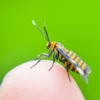
Bites and Stings

-
 play_arrow
play_arrow
Bites and Stings Dr Rosie
Summer and Insect Bites: How to Stay Safe and Comfortable
When summer arrives, so do more opportunities to enjoy the outdoors – picnics, hikes, and trips to the park. However, the warm weather also brings an increased chance of being bitten or stung by insects like mosquitoes, bees, wasps, and ants.
Why Do Bites and Stings Happen More in Summer?
Insects are more active in warmer months. They’re attracted to sweat, food, bright colours, and floral scents – things we tend to have plenty of in summer.
How to Avoid Insect Bites and Stings
- Use insect repellent: Products containing DEET or picaridin are effective for deterring mosquitoes and other biting insects.
- Wear protective clothing: Long sleeves, pants, socks, and closed shoes offer a barrier.
- Avoid scented products: Perfumes, scented lotions, and shampoos can attract insects.
- Stay away from nests and hives: Be cautious near flowers, bushes, and areas where insects are active.
- Eat indoors when possible: Food attracts insects—especially sweet drinks and fruits.
- Keep windows and doors closed or screened: This helps keep insects out of your home.

If You Get Bitten or Stung: Self-Help Remedies
- Remove the stinger: If stung by a bee, gently scrape out the stinger—don’t squeeze it.
- Clean the area: Wash with soap and water to prevent infection.
- Apply a cold pack: Use a cool compress for up to 10 minutes to reduce swelling and soothe pain.
- Take antihistamines: Oral antihistamines can help relieve itching and swelling.
- Use hydrocortisone cream or calamine lotion: These soothe irritation at the skin’s surface.
- Avoid scratching: Scratching can cause infection.
- Elevate the area: If the bite or sting is on an arm or leg, keeping it raised may help minimize swelling.
Most insect bites and stings are harmless and improve within a few days. However, seek medical advice if you notice signs of an allergic reaction (such as difficulty breathing or swelling of the face or throat), or if the area looks infected (with spreading redness, pus, or warmth).
Enjoy summer safely by taking precautions and knowing how to care for bites and stings!



